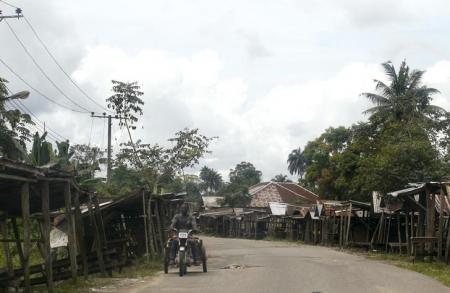Slumped in a chair at Port Harcourt airport in Nigeria’s Delta region, community leader Udengs Eradiri warns that attacks on oil facilities there are likely to escalate unless the government “changes its body language”.
Intensifying attacks in the Niger Delta this year have driven the OPEC member’s oil output to a more than 20-year low, prompting President Muhammadu Buhari to move in more soldiers.
The effects can be seen on the pot-holed roads of Port Harcourt and Yenagoa, two major cities in the Delta, where the army has set up checkpoints less than a mile apart.
Buhari hopes that will protect oil facilities. But for Eradiri – head of the Ijaw Youth Council, representing one of the largest ethnic groups in Nigeria – the tactics will only fuel anger about poverty and push more young men into militancy.
“There is a quest for survival in the Niger Delta, not criminality,” said Eradiri, while stranded at the airport due to a jet fuel shortage – a symptom of the economic malaise gripping the West African nation.
Eradiri said Buhari had opted for confrontation by cutting by two-thirds a 2009 amnesty plan that offered militants cash and job training in exchange for stopping the attacks.
“The body language of this administration did not suggest that they wanted a peaceful environment,” he said. “Once the presidency begins to do what is right, they (militants) will be restrained.” Delta residents, most of whom live on less than $2 a day, have long demanded a greater share of oil revenues that account for 70 percent of national income.
“We are ready for a total showdown soon,” a former pipeline attacker called “General Felix” told Reuters by telephone, his voice trembling with anger. “The amnesty has failed and they have not paid salaries.”
He said he had not been paid his amnesty stipends for about three months, a common complaint from other former militants.
With annual inflation near a six-year high of 13.7 percent in April, the cost of living is rising rapidly.
MORE MILITANT GROUPS
At last year’s presidential election, the mostly Christian Delta voted for their local “son” Goodluck Jonathan, but he was defeated by Buhari, a Muslim northerner.
Over recent weeks, with a president who has never visited the Delta, who has vowed to crush saboteurs, and who has not mentioned widespread poverty, new militant groups have been springing up. The most prominent one, the Niger Delta Avengers, said it was behind several major strikes, most recently a second attack against a Chevron facility reported late on Wednesday.
The Avengers have called on oil firms to leave the Delta by the end of this week, but the militant scene is splintered into factions, each with their own list of demands. A new group, Egbesu Mightier Fraternity, wants the release from detention of the man who leads a group calling for the secession of a southeastern region, the site of the 1967-70 Biafran war.
Another, Red Egbesu, said it wants authorities to end a freeze on the bank accounts of former militant leader Government Ekpemupolo, known as Tompolo, who is wanted by authorities.
CREEKS
Baburaye Dakolo – a clan leader based in Gbarantoru, a town in Bayelsa state in the delta – said militant groups, whatever their demands, were a magnet for the unemployed young men idly sitting beside Yenagoa’s busiest roads.
Unemployment in Nigeria rose to 12.1 percent in the first quarter from 10.4 percent in the previous three months.
“If you give them an opportunity to earn a living they will not do the sabotaging,” he said.
Under the amnesty, which was worth about $300 million annually before the cuts, thousands have received training, but have struggled to land jobs in the oil industry that is dominant and mainly hires highly skilled workers.
A Nigeria-based security expert, who did not want to be named, said the military push was likely to be ineffective – the army is unfamiliar with the delta’s creeks.
He said the Avengers seemed to be operating in small groups blowing up pipelines with the help of oil workers before disappearing in the hard-to-access terrain, which made it almost impossible to catch them.
Finding ways to exploit rifts between the “boys” in the creeks and often unpopular militant leaders, some of whom became millionaires from generous pipeline protection contracts granted under the amnesty, may prove to be a more successful approach.
“Some of our leaders are not being sincere to us – they don’t pass on the money to the foot soldiers,” said Karo Edoro, who attacked pipelines in the creeks for 10 years before joining the amnesty in 2011.
“The leaders will not go back because they’re living very well,” he said of senior militants who have built luxury villas in Yenagoa and bought four-wheel jeeps.
(Reuters)














